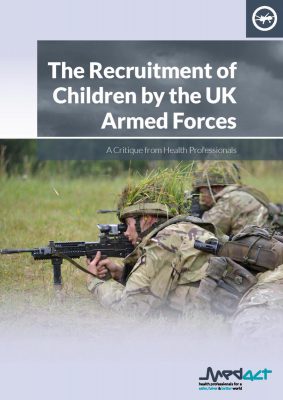The Recruitment of Children by the UK Armed Forces: a Critique from Health Professionals

Medact’s report on the long-term impacts of the British military’s recruitment of children under the age of 18, presents evidence linking ‘serious health concerns’ with the policy, and calls for a rise in the minimum recruitment age.
Medact is a public health charity. The report looks at the psychological and psychosocial vulnerabilities of adolescents in the context of military recruitment marketing strategies and making long-term risky decisions and examines the evidence that under 18 recruits face greater risks to health than adult recruits, across the course of an armed forces career.
The report’s findings include:
- Child recruits are more vulnerable to PTSD, alcohol abuse, self-harm, suicide, death and injury during an armed forces career when compared to adult recruits.
- Military recruitment marketing takes advantage of adolescent cognitive and psychosocial vulnerabilities.
- The current practices for recruiting children in to the British armed forces do not meet the criteria for full and informed consent.
- Those recruited as children, upon turning 18, are more likely than adult recruits to end up in frontline combat roles which carry greater risks than other roles.
’16 and 17 year olds (and to a lesser extent, many young adults as well) are still maturing emotionally and intellectually. This period of development is characterised by more impulsive and emotionally driven decision-making, which is only tempered by cognitive and rational decision-making processes later in the developmental trajectory.’
The UK is one only a handful of countries worldwide to still allow recruitment from age 16, a policy which has been strongly criticised by multiple UN and UK parliamentary bodies, child rights organisations and human rights groups. The report calls for the recruitment age to be raised to 18 in line with recommendations from the UN Committee on the Rights of the Child, children’s rights organisations in the UK and the UK’s Children’s Commissioners.
